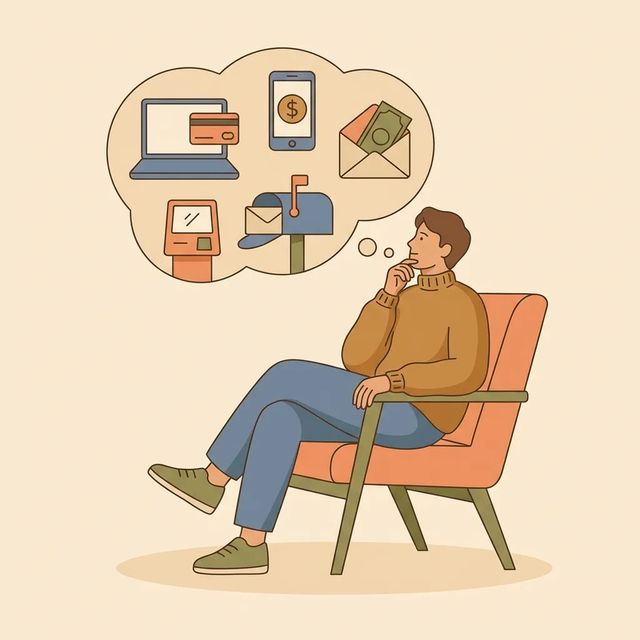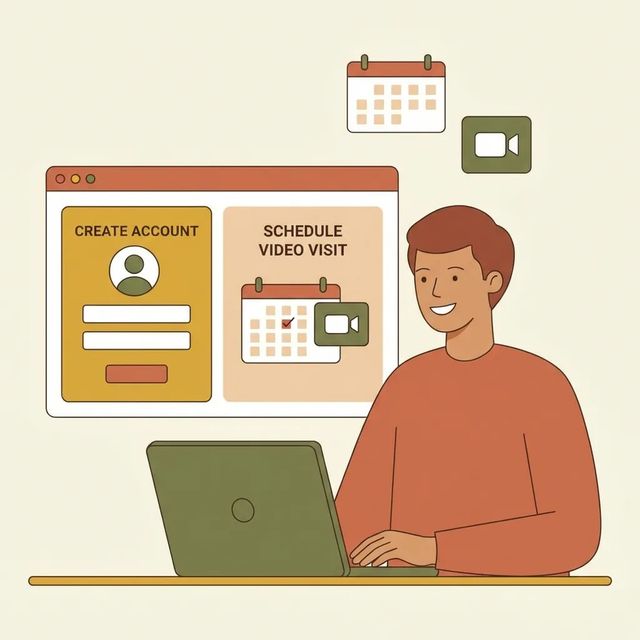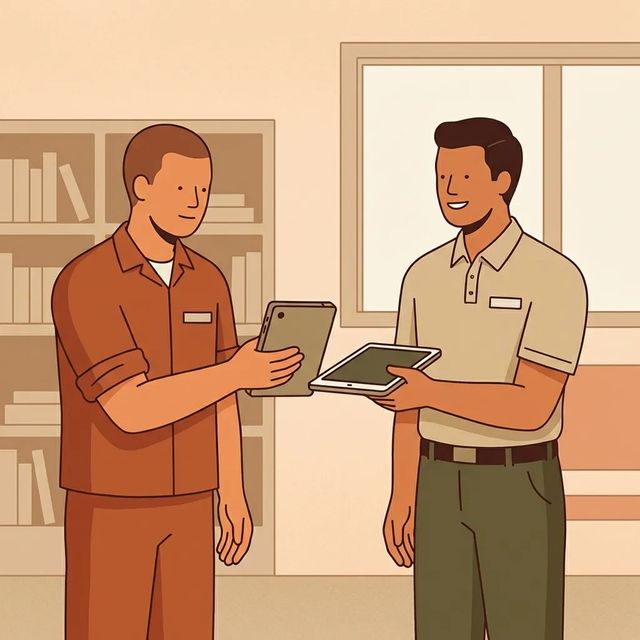Pleasant Valley State Prison
Explore
Find an Inmate at Pleasant Valley State Prison
Search for a loved one and send messages and photos in minutes.

Guides for This Facility

How to Send Money to Facility
Before sending money, confirm which vendor the facility uses and whether you need an online account to get started.
Read Guide
How to claim a GTL VisitMe account and schedule a video visit (for PVSP families)
Setting up video visits can feel like a lot the first time around. But once your GTL VisitMe account is claimed, you can book a time slot online and get confirmation instantly.
Read Guide
Pleasant Valley State Prison: Exact Securus Transition Dates (Phones & Tablets) and What Families Should Expect
Pleasant Valley State Prison is switching phone and tablet communications to Securus on a set schedule. Here are the exact dates, what's changing, and how to prepare so you're not caught off guard.
Read GuideAt a Glance
Visitation
- Pleasant Valley State Prison uses GTL's visitation portal where visitors sign in to schedule and manage visits.
- The GTL portal describes instant confirmation when a visit is scheduled.
- New visitors can create or claim a scheduling account using the portal's 'CLAIM ACCOUNT' link.
Communication
- Securus is the CDCR communications provider for Pleasant Valley State Prison.
- Securus plans to implement telephone calls, video calls, and electronic messaging at Pleasant Valley starting in September.
- An online Securus account is not required to receive free telephone calls but will be required for video calls and electronic messaging when available.
Sending Money
- The CDCR visitors page for sending money to Pleasant Valley State Prison returned only a short loading message in our source.
- GTL’s visitor/deposit portal includes a 'CLAIM ACCOUNT' link for new users to create an account.
- You can generally add money via online/mobile portals, phone deposits, lobby kiosks, or U.S. Postal money orders, but accepted options depend on the facility and vendor.
Based on official sources and community feedback. Learn how we verify
Topic Overviews
Visitation
Pleasant Valley State Prison uses GTL's VisitMe portal for visit scheduling. You'll get instant confirmation once you book through the system. New to the portal? Use the "CLAIM ACCOUNT" link to set up your account, then sign in. Pick an available date and visit type, confirm your booking, and you're set. The portal works on computers, smartphones, and tablets. Before scheduling, make sure you have a valid photo ID and confirm you're on the incarcerated person's approved visiting list.
Read full guideCommunication
Pleasant Valley State Prison transitioned to Securus as its CDCR communications vendor. Phone calls, video calls, and electronic messaging started rolling out in September. You can receive free phone calls without creating an online account. Video calls and messaging require a Securus account once those services go live. For video, Securus uses Video Connect, a web-based system that lets you schedule and join sessions from an app, computer, or tablet. For tablet rollout timing and costs, check the CDCR tablets page. Want to be ready when video and messaging launch? Create your account and add funds ahead of time.
Read full guideSending Money
Sending money to someone at Pleasant Valley State Prison is straightforward once you confirm the current deposit method. Our source copy of the CDCR visitors page returned only a loading message, so check the live official page before sending anything. Many facilities use third-party vendors for deposits. GTL's portal, for example, includes a "CLAIM ACCOUNT" link for new users. Deposit options often include online or mobile portals, phone deposits, lobby kiosks, and U.S. Postal money orders, but the exact methods depend on the facility and vendor. Money in a person's trust account typically covers commissary, phone time, and hygiene items. Court-ordered deductions may reduce the balance. To avoid delays, confirm the person's full name and CDCR number, then follow the vendor's instructions.
Read full guideCommon Questions
Showing 6 of 9How do I create or claim a GTL VisitMe account to schedule a visit at Pleasant Valley State Prison?
Click the "CLAIM ACCOUNT" link on GTL's VisitMe portal to create or claim your scheduling account. Then sign in with your email/Visitor ID and password. If you can't log in, use the portal's password reset option.
VisitationWill my visit at PVSP show as confirmed immediately after booking?
The GTL portal provides instant confirmation when you schedule a visit. For extra reassurance, check your portal confirmation details. Confirmation practices can vary, so the facility page may have additional information.
VisitationCan I schedule a visit from my phone or tablet for Pleasant Valley State Prison?
Yes. Schedule visits from a computer, smartphone, or tablet through the online portal. Sign in to GTL's VisitMe portal for PVSP and choose from available visit options. Visit types and availability vary by facility.
VisitationWhen will Securus services (phone, video, messaging) start at Pleasant Valley State Prison?
According to Securus, telephone calls, video calls, and electronic messaging at Pleasant Valley State Prison began rolling out in September.
CommunicationDo I need a Securus account to receive phone calls from someone at Pleasant Valley?
No. Securus advises you do not need an online account to receive free telephone calls.
CommunicationHow do video visits work for families of someone at Pleasant Valley State Prison?
Video visits use Securus Video Connect, a web-based tool for scheduling and joining sessions through an app, computer, or tablet. Create a Securus account and add funds ahead of time so you're ready when video and messaging go live. For tablet rollout dates and costs, check the CDCR tablets page.
CommunicationMore Guides
Ready to Connect?
Search for your loved one to start communicating today
Did You Know?
You'll sign in to the GTL visitation portal to schedule and manage upcoming visits, and the portal shows instant confirmation for visits.
This guide is based on feedback from dozens of families and official facility documentation. Learn how we verify
